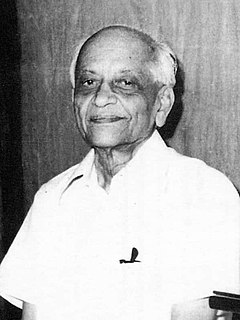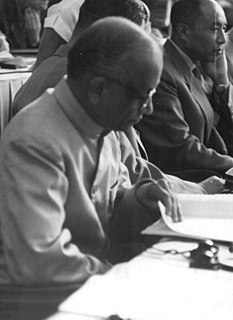Related Research Articles

Indira Priyadarshini Gandhi was an Indian politician and a central figure of the Indian National Congress. She was the 3rd prime minister of India and was also the first and, to date, only female prime minister of India. Gandhi was the daughter of Jawaharlal Nehru, the 1st prime minister of India. She served as prime minister from January 1966 to March 1977 and again from January 1980 until her assassination in October 1984, making her the second longest-serving Indian prime minister after her father.

Rajiv Ratna Gandhi was an Indian politician who served as the sixth prime minister of India from 1984 to 1989. He took office after the 1984 assassination of his mother, then Prime Minister Indira Gandhi, to become the youngest Indian Prime minister at the age of 40.

The Indian National Congress (INC), colloquially the Congress Party but often simply Congress, is a political party in India with widespread roots. Founded in 1885, it was the first modern nationalist movement to emerge in the British Empire in Asia and Africa. From the late 19th century, and especially after 1920, under the leadership of Mahatma Gandhi, Congress became the principal leader of the Indian independence movement. Congress-led India to independence from the United Kingdom, and powerfully influenced other anti-colonial nationalist movements in the British Empire. Due to its enduring history, the Congress is often called the "grand old party".

Elamkulam Manakkal Sankaran Namboodiripad, popularly known as EMS, was an Indian communist politician and theorist, who served as the first Chief Minister of Kerala in 1957–1959 and then again in 1967–1969. As a member of the Communist Party of India (CPI), he became the first non-Congress Chief Minister in the Indian republic. In 1964, he led a faction of the CPI that broke away to form the Communist Party of India (Marxist). He completed his graduation from St. Thomas College, Thrissur Kerala.

The Communist Party of India (Marxist) is a communist political party in India. It is the largest communist party of India in terms of membership and electoral seats and one of the national parties of India. The party emerged from a split in the Communist Party of India (CPI) on 7 November 1964. As of 2022, CPI(M) is a part of ruling alliances in two states — the Left Democratic Front in Kerala and the Secular Progressive Alliance in Tamil Nadu. CPIM has representation in the legislative assemblies of 9 states.

The Communist Party of India (CPI) is the oldest communist party in India and one of the eight national parties in the country. The CPI was founded in Kanpur on 26 December 1925.

Jyoti Basu was an Indian politician and one of the most prominent leaders of Communist movement in India. He served as the 6th and longest serving Chief Minister of West Bengal from 1977 to 2000. He was one of the founding member of the Communist Party of India(Marxist). He was the member of politburo of the party since its formation in 1964 till 2008. He was also the member of West Bengal Legislative Assembly for 11 times. He also held Offices in Government of West Bengal as Deputy Chief Minister of West Bengal, Home minister of West Bengal, Minister of Planning and Development, Minister of Finance, Minister of General administration, Minister of Commerce, Industries and Industrial Reconstruction. In his political career of Basu spanning over seven decades, he was noted to have been the India's longest serving chief minister in an elected democracy, at the time of his resignation.
Indian Congress (Socialist) also known as Congress (Secular) was a political party in India between 1978 and 1986.

Jagjivan Ram, known popularly as Babuji, was an Indian independence activist and politician from Bihar. He was instrumental in the foundation of the All India Depressed Classes League, an organisation dedicated to attaining equality for untouchables, in 1935 and was elected to Bihar Legislative Assembly in 1937, after which he organised the rural labour movement.
The Indian National Congress (U) was a breakaway faction of the Indira Gandhi-led Congress (I), formed in July 1979 by D. Devaraj Urs, the then Chief Minister of Karnataka. Urs' explanation of the split was the return of Indira's son Sanjay Gandhi into the party fold. Urs took with him many legislators from Karnataka, Kerala, Maharashtra and Goa including future Union Ministers and Chief Ministers, Yashwantrao Chavan, Dev Kant Baruah, Kasu Brahmananda Reddy, A.K. Antony, Sharad Pawar, Sarat Chandra Sinha, Priyaranjan Das Munshi and K. P. Unnikrishnan.
The All India Communist Party (AICP) was a communist party in India. It was formed after a split in the Communist Party of India in 1980, by a section of CPI cadres dissatisfied with the political changes that occurred during the 1978 Bhatinda conference of CPI. During most of the 1970s CPI had supported the government of Indira Gandhi and the Indian National Congress. But after the electoral defeat of Gandhi in 1977 CPI began to reconsider its relation to the Congress. After the Bhatinda conference CPI distanced itself from the Congress and aligned itself with the Communist Party of India (Marxist) instead, promoting left unity. The founders of AICP wanted to retain the close relationship with the Congress.

Shripad Amrut Dange was an Indian Politician who was a founding member of the Communist Party of India (CPI) and a stalwart of Indian trade union movement. During the 20th century, Dange was arrested by the authorities for communist and trade union activities and was jailed for an overall period of 13 years.
Socialism in India is a political movement founded early in the 20th century, as a part of the broader movement to gain Indian independence from colonial rule. The movement grew quickly in popularity as it espoused the causes of India's farmers and labourers against the zamindars, princely class and landed gentry. Socialism shaped the principal economic and social policies of the Indian government but mostly followed Dirigisme after independence until the early 1990s, when India moved towards a more market-based economy. However, it remains a potent influence on Indian politics, with many national and regional political parties espousing democratic socialism.
Communism in India (1925-1964) has existed as a social or political ideology as well as movement since at least as early as the 1920s. In its early years, the communist ideology was harshly suppressed through legal prohibitions and criminal prosecutions. Eventually, the communist parties became ensconced in national party politics, sprouting several political offshoots.

The sixth legislative assembly election of Tamil Nadu was held on 10 June 1977. All India Anna Dravida Munnetra Kazhagam (AIADMK) won the election defeating its rival Dravida Munnetra Kazhagam (DMK). M. G. Ramachandran, the AIADMK founder and a leading Tamil film actor, was sworn in as Chief Minister for the first time. The election was a four-cornered contest between the AIADMK, DMK, the Indian National Congress (INC) and the Janata Party. Earlier in 1972, M.G.R had founded the AIADMK following his expulsion from the DMK after differences arose between him and DMK leader M. Karunanidhi. On 31 January 1976, Karunanidhi's government was dismissed by the central government of Prime Minister Indira Gandhi citing non-co-operation for MISA and President's rule was imposed on the state. Karunanidhi had been at odds with Indira Gandhi over his opposition to Emergency and allied with Janata Party founded by Jayaprakash Narayan. Meanwhile, M.G.R had developed a close relationship with Indira Gandhi and supported the Emergency. M.G.R remained as Chief Minister until he died in 1987, winning the next two elections held in 1980 and 1984. This election gave concrete proof that Tamil people idolized M.G.R, as he won the State elections in alliance with Indira's Congress, despite the people hating Indira for implementing Emergency. Due to this feat, M.G.R inadvertently became an example for entry of famous actors to enter politics, with a hope that they too may become Chief minister one day. then Telugu superstar N.T.R followed M.G.R's suit in 1983 and won the Andhra Pradesh general Elections to become the Chief Minister of Andhra Pradesh. Since then, no other actor has been able to recreate M.G.R's achievements in electoral Politics.

Early relations between India and the Soviet Union were hostile and based on mutual suspicion. While relations were established in 1947 after India's independence, Soviet leader Joseph Stalin had a negative view of Mahatma Gandhi, the Indian National Congress, and Jawaharlal Nehru, whom he viewed as tools of the British and monopoly capitalism. Following Stalin's death relations became warmer with close cooperation between the two states. Relations ended in 1991 with the Dissolution of the Soviet Union.

The foreign policy of the Indira Gandhi government was the foreign policy of India between 1967 and 1977 during the Indira Gandhi premiership. It included a focus on security, by fighting militants abroad and strengthening border defenses. On 30 October 1981 at the meeting organised to mark silver jubilee celebration of the School of International Studies, Gandhi said, "A country’s policy is shaped by many forces- its position on the map, and the countries which are its neighbours, the policies they adopt, and the actions they take, as well as its historical experiences in the aggregate and in terms of its particular success or traumas."
Legislative Assembly elections were held in the Indian state of West Bengal on March 11, 1972.

In 1964 a major split occurred in the Communist Party of India. The split was the culmination of decades of tensions and factional infighting. When India became independent in 1947, differences arose of how to adapt to the new situation. As relations between the Nehru government and the Soviet Union improved, a faction that sought cooperation with the dominant Indian National Congress emerged within CPI. This tendency was led by S.A. Dange, whose role in the party hierarchy became increasingly controversial. When the Sino-Indian War broke out in 1962 Dange's opponents within CPI were jailed, but when they were released they sought to challenge his leadership. In 1964 the party was finally divided into two, with the left faction forming the Communist Party of India (Marxist). The split had a lot of regional variations. It also impacted other organizations, such as trade union and peasant movements. The split has been studied extensively by scholars, who have sought to analyze the various domestic and international factors involved.
The Indian Society for Cultural Co-operation and Friendship (ISCUF) is an organization in India promoting people-to-people cultural understanding and friendship. The organization was initially known as the Friends of the Soviet Union and, later, the Indo-Soviet Cultural Society (ISCUS).
References
- ↑ Bhattacharya, Mrimoy in Banerjee, Gopal (ed.), S.A. Dange – A Fruitful Life. Kolkata: Progressive Publishers, 2002. p. 141
- ↑ Arundhati Roy (1987). The Soviet Intervention in Afghanistan: Causes, Consequences, and India's Response. Associated Publishing House. p. 104. ISBN 978-81-7045-006-1.
- 1 2 Andersen, Walter K.. India in 1981: Stronger Political Authority and Social Tension, published in Asian Survey, Vol. 22, No. 2, A Survey of Asia in 1981: Part II (Feb., 1982), pp. 119-135